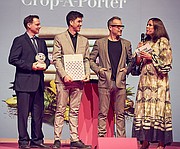MANUFACTURING
Circular Systems Hits Boot Camps to Learn Sustainability
Isaac Nichelson is on a mission. He wants to make the fashion industry more sustainable and deal with a predicted decline in the supply of natural fibers for textiles.
In 2017, he founded Los Angeles–based Circular Systems with Canada-based entrepreneurs Yitzac Goldstein and Geof Kime, who have backgrounds in textile science, plastics engineering and sustainable agriculture. The company is a clean-tech new-materials venture working on solving problems that will pop up with a growing population.
“Over the next 15 years, the world needs 40 percent more textiles, and cotton may only be able to supply 10 percent of this growth,” Goldstein said.
To take care of this, Circular Systems created a division called Agraloop, which transforms food-crop waste—including pineapple leaves, sugar-cane bark and oil-seed hemp—into a natural fiber product.
It also created Orbital, which makes high-performance yarns out of recycled fibers, and Texloop Recyling, which recycles fabric.
To take his company one step beyond, Nichelson has been hitting various boot camps organized by companies around the world to help environmentally conscientious business people to become more successful entrepreneurs. “It’s an investment in the future,” Nichelson said. “They need these technologies to succeed in providing critical solutions for the textile and fashion industry.”
The boot camps come at a critical time for Circular Systems, which hopes to close a seed round of funding this summer when it is scheduled to file patents for its products.
To further his knowledge, Nichelson received a fellowship to attend the second annual Levi Strauss & Co. Collaboratory, a special workshop June 21–24 with Levi’s executives where ideas were traded among a number of people. The focus of the second Collaboratory was climate change.
“It was a powerful four-day intensive experience,” Nichelson said. “They aligned everyone with a personal mentor based on their needs as an entrepreneur.”
During the workshop, Collaboratory fellows listened to talks from thought leaders of the sustainable fashion movement, including Andrew Morlet of the Ellen MacArthur Foundation; Kirsten Spaulding from the nonprofit Ceres; Annie Gullingsrud, author of “Fashion Fibers: Designing for Sustainability”; and Bart Sights, the vice president of technical innovation at Levi’s. Other speakers included entrepreneurs such as Bayard Winthrop of American Giant, a label made in the U.S.
The Collaboratory fellowship is the latest in a round of business boot camps and honors for Nichelson’s Circular Systems. On March 20, Agraloop was awarded first place and $349,000 by the Global Change Award, which is sponsored by the H&M Foundation. It is a nonprofit funded by the founders and main owners of Swedish fashion retailer H&M.
Part of the Global Change Award package is enrollment in a few “accelerators,” or boot camps where executives and consultants help the award winners develop their business plans.
The accelerators are important for a new business. “It amplifies exposure to the market. It helps validate the business model we are proposing,” Nichelson said. “It helps us come into contact with more human and financial resources. It helps us to become better businesspeople.”
Last year, Circular Systems was selected to participate in the Fashion for Good Plug & Play accelerator produced by Belgian-headquartered retailer C&A. Also participating in this venture was the Kering Group, which runs brands including Gucci, Saint Laurent and Alexander McQueen as well as high-end French retailer Galeries Lafayette.
Held at C&A’s Fashion for Good center in Amsterdam, the accelerator hopes to raise the profile of companies working in sustainable fashion and eventually interest the wider fashion industry in these companies’ ideas.
These boot camps are proving beneficial for others, too. John Moore, cofounder of Outerknown, a label headquartered in Culver City, Calif., was awarded a fellowship in the inaugural class of the Levi’s Collaboratory. “[Levi’s] brought their industry veterans and leaders into the room to share with us their best practices and to inspire us to think in new and different ways,” Moore said. “A multi-billion-dollar household name like Levi’s is sharing vision, learning, resources and direction, with a bunch of artists, entrepreneurs, designers and suppliers all working together. It doesn’t happen often.”
Moore said that for most of the fellows, the workshop comes at a crucial time when these companies are just starting out.






















